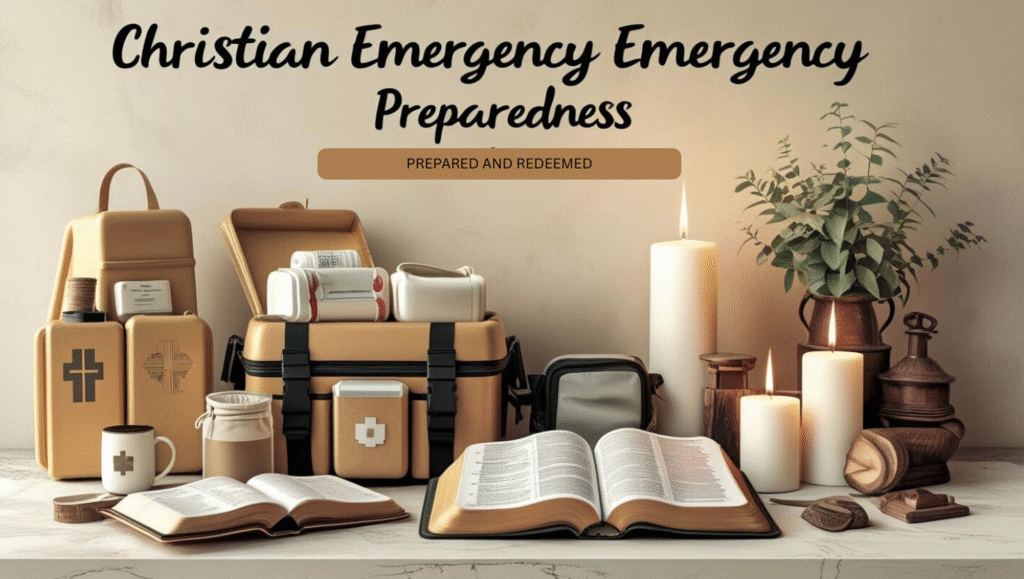The Ultimate Guide to Christian Emergency Prepping: Body, Soul, and Spirit
Introduction: Prepared and Redeemed in Uncertain Times We are living in a world full of uncertainty. From natural disasters and economic instability to global unrest and moral decline, the need to prepare has never felt more urgent. But as followers of Jesus Christ, our preparation goes beyond stocking food and supplies — it must include preparing our hearts, minds, and spirits.
In this comprehensive guide, we’ll walk through what it means to be a Christian prepper — someone who prepares not in panic, but in purposeful obedience, grounded in biblical wisdom. You’ll learn how to get ready physically, spiritually, and emotionally, while staying centered on Christ, your ultimate refuge.

1. Why Christians Should Prepare: Biblical Foundations The Bible is full of wisdom about planning ahead. Noah built the ark in obedience. Joseph stored grain in Egypt. Proverbs 22:3 says, “The prudent see danger and take refuge, but the simple keep going and pay the penalty.”
Prepping isn’t about fear — it’s about faithful stewardship. God calls us to care for our families (1 Timothy 5:8) and to be wise like the ant who prepares in the summer (Proverbs 6:6-8). This section will walk through these and other verses that support wise, God-honoring preparedness.
2. Preparing the Body: Physical Readiness for Crisis Practical preparedness begins with the physical:
- Food and Water: Build a long-term pantry and water storage
- First Aid and Medications: Create a medical go-bag
- Shelter and Warmth: Have a plan for power outages or evacuation
- Communication Tools: Emergency radios, chargers, walkie-talkies
- Defense and Safety: Guarding your home in times of unrest
This section includes checklists, sourcing tips, and how to stock wisely without hoarding. It’s about providing, not panicking.
3. Preparing the Spirit: Building a Faith that Endures Without spiritual preparation, all the gear in the world won’t bring peace. When chaos strikes, your relationship with God must be your anchor.
- Develop a daily habit of prayer and Scripture reading
- Memorize key verses for comfort and courage (Psalm 46, Matthew 6:25-34)
- Keep a Bible in every go-bag and supply kit
- Consider fasting and spiritual disciplines to grow in dependence on God
In times of darkness, your faith becomes the light others may need.
4. Preparing the Soul: Emotional Resilience in Crisis Jesus said, “In this world you will have trouble. But take heart! I have overcome the world” (John 16:33).
- Practice emotional grounding through prayer and worship
- Encourage your family to talk about fears and build coping strategies
- Set routines during a crisis to preserve peace
- Use journaling, music, or nature walks to reflect on God’s faithfulness
Resilience isn’t just survival — it’s hope that endures.

5. Preparing the Family: Teaching Your Household to Trust and Prepare God calls parents and leaders to train up children in the way they should go (Proverbs 22:6). Teach your family:
- Basic survival skills (cooking, gardening, first aid)
- Scripture memorization and worship songs
- Family devotional times focused on God’s provision
- Practicing “peace drills” like you would a fire drill — praying and trusting God in practice before crisis
Prepared families become lights to others in a storm.
6. Off-Grid and Long-Term Prep: Wisdom for the Days Ahead If you feel called to deeper levels of self-reliance, here’s where to begin:
- Solar power systems and portable generators
- Heirloom seed storage and sustainable gardening
- Water filtration and off-grid hygiene setups
- Home-based security and community networks
All of this must be built with trust in God’s provision, not trust in gear alone.
7. Spiritual Tools for Every Prepper’s Kit Here are items every Christian prepper should include in their emergency plans:
- Compact Bible or New Testament
- Printed list of encouraging Scriptures
- Gospel tracts to share hope with others
- A journal for prayers and testimonies
- A small cross or reminder of Christ’s sacrifice
Don’t just survive — bring the presence of Jesus with you.
8. The Eternal Prep: Are You Ready to Meet Jesus? No matter how well we prepare for earthly trials, our ultimate preparedness must be for eternity. Have you put your faith in Jesus Christ? Have you accepted His gift of salvation?
He is your true refuge, your ark, your shelter in the storm.
9. Explore More: Practical and Spiritual Resources to Grow Your Readiness To dive deeper into Christian prepping, check out these helpful posts and pages:
- Emergency Preparedness Checklists: What Every Family Needs to Be Ready
- Spiritual Prepping Guide: Building Faith That Endures
- Trusted Products & Reviews for gear that aligns with your values
- How to Know Jesus — the most important preparation of all
Each of these guides will equip you with real-world knowledge and eternal truth as you live faithfully in uncertain times.
🙏 Prayer of Salvation If you’re ready to receive Jesus as your Savior, pray this from your heart:
“Lord Jesus, I know that I am a sinner and I need Your grace. I believe You died on the cross for my sins and rose again. I turn from my old life and ask You to forgive me, fill me with Your Holy Spirit, and lead me from this day forward. Be my Savior and my Lord. In Jesus’ name, Amen.”
Final Word: Prepared and Redeemed At the end of the day, the most important thing we can store up is faith. Preparedness is wise. But redemption is eternal.
Start preparing today — not just for what might happen, but for what you know is true: Jesus is coming again. Will He find you ready?
Visit our Trusted Products & Reviews page for tools and resources that support both practical and spiritual preparedness.
Prepared in wisdom. Redeemed by grace.

Thank you for this beautifully balanced and deeply rooted guide to Christian preparedness. I really appreciate how you framed prepping not as a fear-based reaction but as a faithful, biblical response grounded in wisdom, stewardship, and trust in God. The distinction between preparing our bodies, souls, and spirits is so important—and often overlooked in other prepping discussions.
The reminder that Noah, Joseph, and even the ant in Proverbs were praised for their foresight really hit home. It’s empowering to know that taking steps to care for our families is not only practical but also scriptural.
I also loved the emphasis on spiritual tools—keeping a Bible, verses of encouragement, and gospel tracts in a go-bag is such a powerful idea. It shifts our mindset from just surviving to serving and shining God’s light, even in times of crisis.
I do have a few questions:
1.) Family Involvement: What are some creative or gentle ways to involve children in prepping without instilling fear—especially when explaining things like blackouts or natural disasters?
2.) Spiritual Prep in Daily Life: What daily habits have helped strengthen your spiritual resilience? How do you practice “peace drills” in your home?
3.) Community Building: Have you found ways to bring like-minded believers together in preparing as a local or church-based group? If so, what’s worked well—and what challenges have you faced?
4.) Faith Over Fear: In moments when prepping begins to feel overwhelming or anxiety-inducing, how do you re-center your focus on Christ and peace?
Thank you so much for your heartfelt comment and encouraging words. It truly blesses me to know that the message came across as both balanced and biblically grounded—because that’s exactly the heart behind Prepared and Redeemed. Prepping isn’t about panic; it’s about walking in wisdom and trusting God as we steward what He’s given us—body, soul, and spirit.
You asked some excellent questions, and I’m honored to share my thoughts:
1.) Family Involvement:
One of the best ways I’ve found to include children in preparedness is by turning it into practical life skills and everyday activities. For example:
Cooking meals over a campfire or on a small stove together (turn it into a “fun challenge”).
Letting them help pack a small emergency bag with snacks, a flashlight, and a favorite Bible verse.
Practicing “lights out” nights where you use lanterns and talk about how God is our light even in the darkest times.
Keeping the tone peaceful and purposeful—not fearful—helps them feel empowered rather than scared.
2.) Spiritual Prep in Daily Life:
For me, building spiritual resilience comes down to daily time in the Word, even if it’s just 10 minutes of Scripture and prayer before the day begins. We also do a family “verse of the week” that we write out and reflect on together.
As for “peace drills,” it’s more about modeling calm in uncertainty. If there’s a storm or power outage, I try to frame it as a reminder to trust God—and we often pray together during those times. Rehearsing faith-based responses in calm moments helps us all stay anchored when things get real.
3.) Community Building:
Yes! We’ve slowly started building a local circle of like-minded believers. One thing that’s worked well is hosting low-pressure events like “preparedness potlucks” or Bible studies with a practical theme—like first aid or food storage tips.
The biggest challenge has been overcoming hesitation—some folks still associate prepping with doomsday fear. But when you lead with Scripture and the heart of stewardship, people become more open. It’s about planting seeds.
4.) Faith Over Fear:
Great question. When prepping starts to feel heavy, I go back to the Psalms—especially Psalm 91 and Philippians 4:6-7. I remind myself that we prepare because we trust, not because we fear. I’ll often step away from the to-do list and just worship, pray, or even go outside and thank God for His provision. That resets everything. The enemy loves to use fear, but Jesus brings peace that surpasses all understanding.
Thank you again for such a rich and thoughtful comment. If you’d ever like to connect more deeply or share your own journey, I’d love to hear from you. May God bless your heart for preparation and your desire to honor Him in all things!
—Jason
Prepared and Redeemed ✝️
Some great advice on being prepared for any emergency, and preparing the soul and the spirit is probably the most important part, as you need to be in the right frame of mind when disaster strikes and have faith in the Lord.
Even by making sure you have rain tanks and solar power in place, it is up to God whether or not you will have the sun to charge the panel or the rain to fill the tank, so although its great to be prepared, you also need spiritual guidance, and this you can only get by building your relationship with the Lord daily.
Thank you so much for your thoughtful words—you summed it up perfectly.
Yes, we can (and should) prepare wisely for physical needs like water, power, and food, but ultimately, it’s the condition of our soul and our trust in the Lord that sustains us. As you said, we can have the best setup in the world, but it’s God who sends the rain and the sun. That daily relationship with Him is what gives us peace when the world feels uncertain.
I love how you pointed out the importance of being in the right frame of mind during a crisis. When our hearts are grounded in Christ, we’re not just reacting in fear—we’re responding in faith, able to help others and shine His light in dark times.
One verse that comes to mind is Proverbs 3:5–6:
“Trust in the Lord with all your heart and lean not on your own understanding; in all your ways submit to Him, and He will make your paths straight.”
That’s the heart of true preparedness—leaning on Him daily.
Thank you again for sharing such wisdom. May the Lord continue to guide and bless you as you prepare both practically and spiritually.
—Jason
Prepared and Redeemed